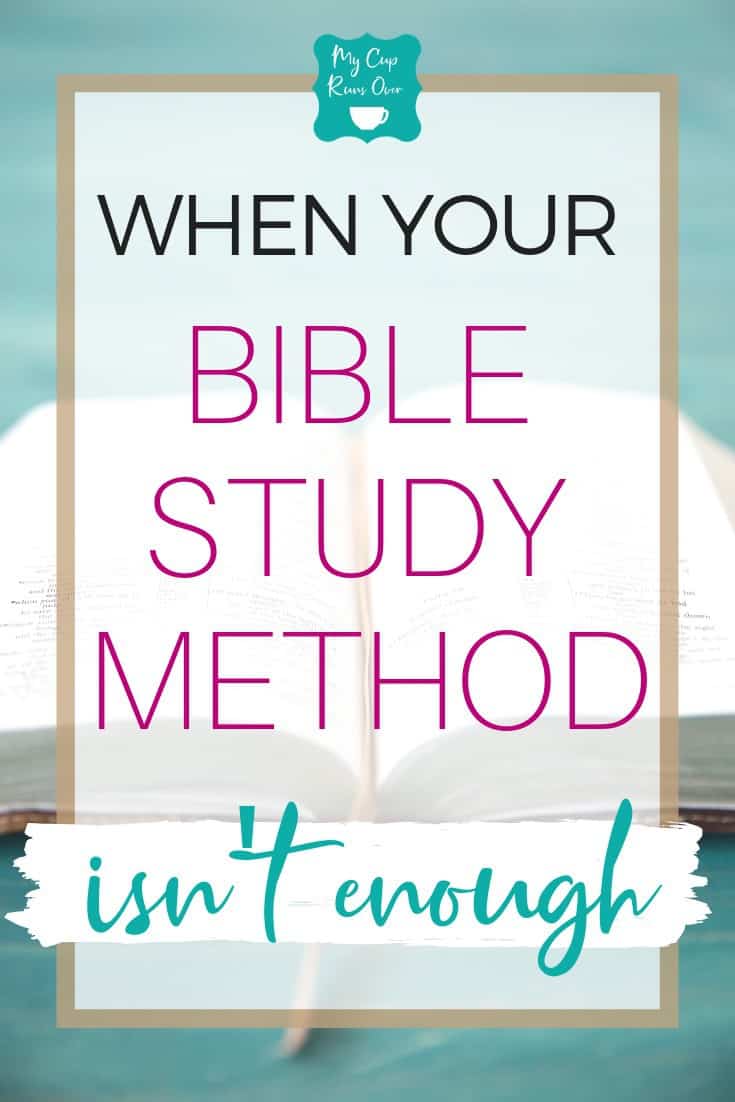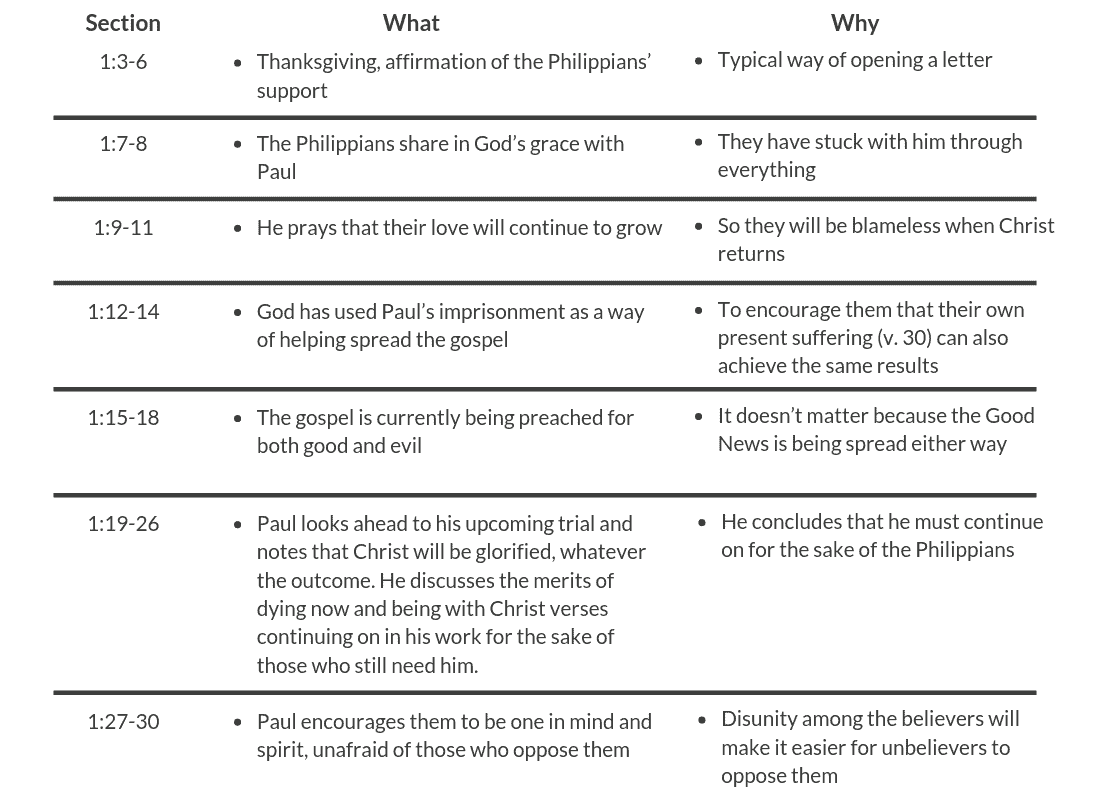When Your Bible Study Method Isn’t Enough

Do you ever feel overwhelmed by the number of Bible study methods that flood Pinterest and many Christian blogs? Do you struggle to find the one that “works best” for you, only to find that you end up not following any at all?
I have to admit, I’m really drawn in by these things. I see all these images of beautifully illustrated Bibles and journals that are laid out neatly with colour-coded sticky notes throughout. Infographics with easy to remember acronyms are hard to resist.
The problem here isn’t a lack of options for studying the Bible; in fact, we likely have more options than we need. The problem is that many of these options don’t feel thorough enough. They teach us to isolate verses and apply them to our lives without ever really understanding the context within which they were written. This leads to confusion and misinterpretation, as well as to a potentially more dangerous problem: a failure to grasp the big picture of God’s story.
Building a Strong Foundation
Some people know their Bibles so well already that these methods can work for them, because they’ve already spent years laying that foundational groundwork. But what about the rest of us? Those who are still getting the lay of the land can’t afford to get caught up in details like colour-coordination just yet. We need to establish firm roots.
A few years ago, I started to feel this deep need to really dig deep into my Bible. I started collecting resources such as Bible dictionaries and various translations, commentaries and study guides. A well-meaning friend who does indeed know her Bible inside and out, suggested to me that this was too much for me to take on as a busy mother. She felt that the timing wasn’t right and that I should just focus on reading through the Psalms for encouragement.
While I would have loved to take this easy out, I knew that my soul would feel restless until it understood God’s Word the way it was supposed to. Finding the time and space to do this type of study isn’t easy when you have four kids with you all day, but it’s so worthwhile.
I suspect that our biggest challenge with developing a consistent Bible study routine as busy women is not a lack of desire or ability, but simply a shortage of time. I know that, personally, it was much easier for me to spend long hours studying God’s Word before I had children to take care of all the time.
The challenges busy women face are many and our ability to overcome them will increase the more that we abide in Him by letting His Word abide in us.
Why is it important for us to study the Bible?
If our goal is to know Jesus, we must know God’s Word, because He is the living incarnation of that Word. John 1 tells us, “In the beginning was the Word, and the Word was with God, and the Word was God. The Word became flesh and made his dwelling among us. We have seen his glory, the glory of the one and only Son, who came from the Father, full of grace and truth.” (v. 1, 14 NIV). To become intimately acquainted with Christ, we must become intimately acquainted with the Word.
It is not enough to skim through it briefly now and then or have a passing familiarity with it. We must study it until we understand it and it is written permanently on our hearts.
Studying the Bible sets us free.
Jesus told us that He is the truth and that the truth will set us free, free from the law of sin and death. (John 14:16, John 8:32, Romans 8:2). How do we know the truth (Jesus)? By abiding in His word (John 8:31).
It encourages us and gives us hope.
When we read the Bible, we are encouraged not only by Jesus, who through His love and grace gives us eternal encouragement and hope (2 Thes. 2:16), but by the humans chronicled in its pages as well. Paul, Peter, Ruth, Isaiah, Elijah, Mary Magdalene. There are so many people in the Bible whose lives continue to speak into ours, thousands of years after they lived. Through their stories, we see God’s goodness, faithfulness, and eternal glory.
It renews our minds and allows us to live in God’s perfect will.
The Bible reveals God’s righteousness and His plan for our salvation. It helps us to know Christ more, builds our faith, leads us into obedience to His laws, and transforms us more into His likeness.
I also think it’s important to note here that studying the Bible not only increases our understanding of its meaning, it also decreases our misunderstandings. Bible verses are so often taken out of context, used as standalone truths, and bended to mean whatever the interpreter may want it to mean.
I’m not suggesting this this misuse of Scripture is always intentional; many of us have good intentions when we use Scripture to defend a certain perspective. But it’s of paramount importance that we take an objective look at Scripture before doing so to ensure that we truly understand its meaning for both its ancient readers and its contemporary ones.
A Complete Bible Study Method that Gives You the Tools to Understand Scripture
There are two main resources that I’ve drawn on to shape my Bible study practice: Foster’s Celebration of Discipline and, to a larger extent, Fee and Stuart’s How to Read the Bible for All Its Worth.
Foster suggests that the most profitable way to spend time in the Word is to structure a private retreat of one to two days, devoting the majority of your waking hours on each of those days to the study of a specific section of Scripture. He acknowledges the logistical challenge of doing so and comments, “I have discovered that the most difficult problem is not finding time but convincing myself that this is important enough to set aside the time.”
While Fee and Stuart do not suggest a particular length of time to devote to study, their method is most conducive to longer study sessions. Personally, I find that by the time I get out all of my resources and read the passage through a couple of times, I don’t want to pack it all up again right away.
I want to sit with it a while, to absorb it and let it sink in. I have questions, and I want to find answers. I check cross-references, which will sometimes send me down a whole other line of only vaguely related questions. It is difficult for me to conduct a session like this in less than thirty to sixty minutes.
I would encourage you to pull out your calendar for the next month and see where you might have some free time. Is there any chance that you could get away for a weekend, or even for a day?
If that’s not an option, could you set aside a few hours on Sunday afternoons or on a quiet weekday morning? Perhaps all you have is half an hour in the morning before your kids are awake. If this is the case, and you will be studying for shorter sessions, I suggest finding a place where you can leave your supplies open so that you do not have to waste time setting it all up and putting it away every day.

Setting Yourself Up for Success with Your Bible Study
Planning your Bible Study Time
Take some time to plan your Bible study time. Where will you do it? When? What might you need to clear off your schedule in order to make this possible? What resources are available to you? Taking a few minutes to think these things through will make it much easier to jump into studying.
When and where should you study?
- Choose a time and place that is ideal for you. Foster recommends getting out of the house if at all possible, and I would encourage you to try this at least some of the time. A change of environment can have a profound impact on your ability to focus.
- If you are able to arrange a mini-retreat for yourself, perhaps in a friend’s guest room, do so! Your whole family will benefit when you take some time alone to spend with the Lord.
- If you cannot leave the house, dedicate a quiet, relatively distraction-free spot in your home where you can set up your materials and have them easily accessible.
How should you study?
- I use a method that combines Foster’s recommendations with Amy Hornbuckle’s Jesus Workbook Method and Fee and Stuart’s method.
- Both Foster and Fee and Stuart strongly recommend reading the selected text straight through several times to get a feel for the passage as a whole, preferably using multiple translations. Foster suggests that, when studying a shorter book you may want to try reading it through every day for a month.
What resources will help?
- You will want to have access to multiple versions of the Bible. I enjoy having hard copies, and over the years we’ve acquired five or six different translations, but you can also find what you need online. The YouVersion Bible App has a large number of translations, including several audio recordings if you want to listen to the passage.
- I also enjoy BibleHub.com a lot. It is very easy to switch between translations and if you are viewing one verse at a time you will see about twenty different translations as well as a selection of cross-references for each verse. BibleGateway.com is another great resource and includes several free commentaries.
- You may also want to check out The Word Bible software (http://www.theword.net/). It is a free downloadable program that contains several translations, different languages, commentaries, dictionaries, books, maps, fonts, different translation files and more. You can compare translations, highlight passages, and take notes right in the program. This can be an extremely useful resource if you like to have everything altogether in one compact location, and would be ideal if you’re planning to work from remote locations.
- A Bible dictionary is an indispensable resource for building your understanding of the Bible. It can help paint a rich picture of the Biblical world, filling in historical, archaeological, geographical, social, and biological details that provide context for what you read. I use the Zondervan Illustrated Bible Dictionary.
- Finally, you may want to have a commentary to help with understanding the historical and contemporary applications of the text. There are several free comprehensive commentaries online such as the Matthew Henry Commentary, but Fee and Stuart recommend that we start building a library of commentaries that focus on individual books of the Bible.
Shop Related Bible Study Tools
Here are some of my favourite resources to help with studying the Bible.
Bible Study Method
Finally, here is the actual process that I use that will help you not only to understand what you’re reading but will also make it come alive for you.
1. Read the passage or book all the way through
One of the challenges with some Bible study methods is that they focus in one or two verses very quickly without allowing you to first ground yourself in the overall context of what is written. If you received a letter from a friend, you wouldn’t immediately jump to page three and start reading from there. You would start from the beginning and read through to the end so that you understood everything she had to say in the way that she thought it best to lay it out. The same is true when we read the Bible.
Before you jump in to study a parable of Jesus or an epistle, for example, you need to get the context. Try taking the time to read a whole gospel or epistle in one sitting before trying to make sense of a smaller passage.
As you read—or listen, if you prefer to use an audio Bible app—jot down some notes, thoughts, and questions as they come to you. Read or listen to the passage again at least one or two more times. Try reading it in another translation to help deepen your understanding.
Your goal at this stage is to gain an understanding of the overall structure of the passage. It needn’t be overly detailed. Every time the author switches to a new subject, just make a note of what has been covered so far. Keep a running list of the questions that arise for you.
2. Study context and content
You will now work through a smaller portion of text, one chapter, perhaps. You will continue reading it through, looking for different things with each additional reading.
Definitions
First, go through and write down any words that you are unfamiliar about or whose meaning you’re not entirely clear on. They might be words that you use regularly, but whose exact meaning could play a significant role in your understanding of the text.
Look these words up in a dictionary and write down their definitions. Use biblehub.com to look up the meaning of the original Greek and Hebrew words. While you’re there, you can also view each verse in multiple translations and start looking up cross references.
Cross references
Studying cross references helps us understand the bigger picture of Scripture, how it all fits together. We also get a sense of the importance of a message or theme by seeing how many cross references it has. If something comes up again and again, it’s probably pretty critical. Write down notes on any pertinent cross references and again, make note of any questions you have. The questions may be completely unrelated to the passage you’re studying, but that’s alright! It will all fit together later on as new connections are made and your overall understanding deepens.
Significant people, history, and background
To really make sense of the meaning of a Bible passage we have to understand the context of the writer and the intended readers. Who were they? What was going on in their lives at that time? What expectations and limitations did they have?
Make a note of each person or group mentioned and then look them up in your Bible dictionary or on a site such as biblestudytools.com.
In researching the historical context, your goal is to find out as much as possible about the place and its people. There are three ideal sources for this information:
1. The text itself
2. Your Bible dictionary
3. The introduction to your commentary
Finally, we must consider the literary context. What was the author trying to convey to the original audience and why? To answer this, we must consider the text at the paragraph level and ask ourselves, “What’s the point?”
Here’s what that might look like for Philippians chapter 1.

3. Personal Application
A lot of Bible study methods jump straight through to personal application, which is clearly a problem. If we do not understand who the author was, what they were saying, who they were saying it to, and why there were saying it, how can we possibly begin to apply it to our own lives?
Now, the method of personal application differs for the different types of books in the Bible. How to Read the Bible for All Its Worth details specific application processes for each type of book. The method described below refers to personal application of the epistles.
The first step in determining what a passage means today is to apply common sense: ask yourself is this content of specific occasional intent or is it intended to convey an eternal truth?
For example, the discussion of Timothy and Epaphroditus in Philippians 2 is information that was directed specifically to the Church at Philippi. Although it may increase our modern understanding of these two men, it is clearly an instruction on how Paul wanted the Philippians to receive them. On the other hand, texts such as “He who began a good work in you will carry it on to completion until the day of Christ Jesus,” (Phil. 1:6), would appear to have lasting significance for all believers.
Fortunately, this common sense method will carry us far in the Epistles. We should be able to sort most of the content into one or the other of these categories without too much difficulty. The problems, of course, lie in the texts that cannot be classified by common sense.
The key to successful interpretation here is a consistent approach. We must put each text through the same lenses of scrutiny. To help us with this, Fee and Stuart offer two guiding rules: 1) “A text cannot mean what it never could have meant to its author or his or her readers,” and 2) “Whenever we share comparable particulars (i.e., similar specific life situations) with the first-century hearers, God’s Word to us is the same as his Word to them.”







